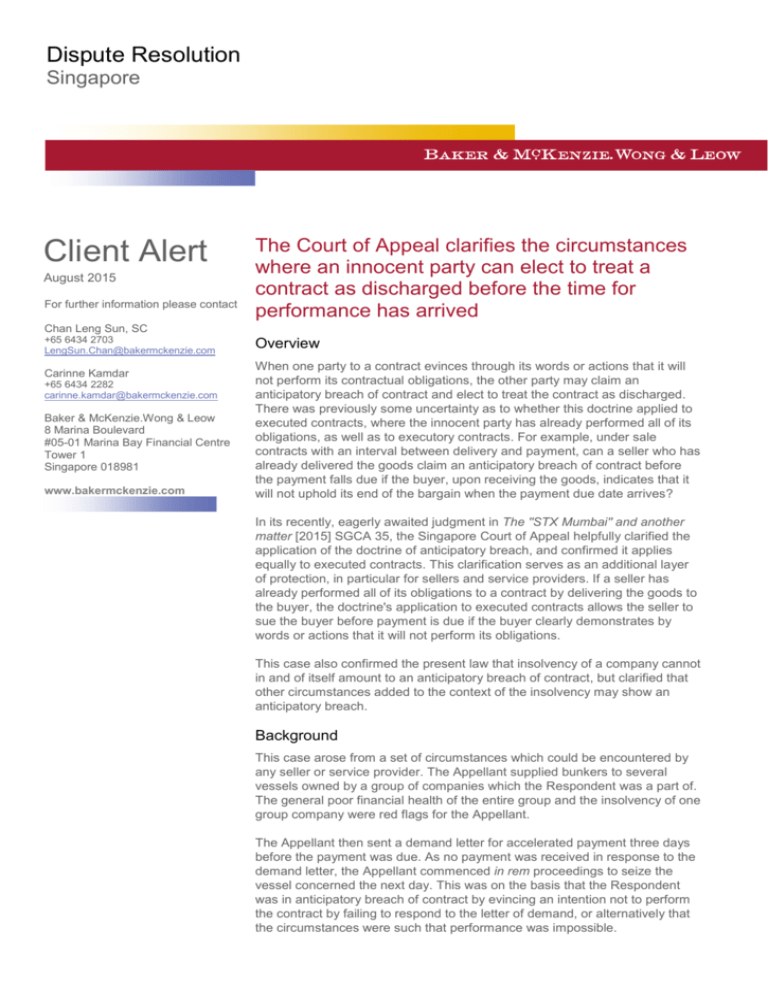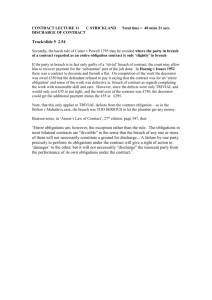
Dispute Resolution
Singapore
Client Alert
August 2015
For further information please contact
The Court of Appeal clarifies the circumstances
where an innocent party can elect to treat a
contract as discharged before the time for
performance has arrived
Chan Leng Sun, SC
+65 6434 2703
LengSun.Chan@bakermckenzie.com
Carinne Kamdar
+65 6434 2282
carinne.kamdar@bakermckenzie.com
Baker & McKenzie.Wong & Leow
8 Marina Boulevard
#05-01 Marina Bay Financial Centre
Tower 1
Singapore 018981
www.bakermckenzie.com
Overview
When one party to a contract evinces through its words or actions that it will
not perform its contractual obligations, the other party may claim an
anticipatory breach of contract and elect to treat the contract as discharged.
There was previously some uncertainty as to whether this doctrine applied to
executed contracts, where the innocent party has already performed all of its
obligations, as well as to executory contracts. For example, under sale
contracts with an interval between delivery and payment, can a seller who has
already delivered the goods claim an anticipatory breach of contract before
the payment falls due if the buyer, upon receiving the goods, indicates that it
will not uphold its end of the bargain when the payment due date arrives?
In its recently, eagerly awaited judgment in The "STX Mumbai" and another
matter [2015] SGCA 35, the Singapore Court of Appeal helpfully clarified the
application of the doctrine of anticipatory breach, and confirmed it applies
equally to executed contracts. This clarification serves as an additional layer
of protection, in particular for sellers and service providers. If a seller has
already performed all of its obligations to a contract by delivering the goods to
the buyer, the doctrine's application to executed contracts allows the seller to
sue the buyer before payment is due if the buyer clearly demonstrates by
words or actions that it will not perform its obligations.
This case also confirmed the present law that insolvency of a company cannot
in and of itself amount to an anticipatory breach of contract, but clarified that
other circumstances added to the context of the insolvency may show an
anticipatory breach.
Background
This case arose from a set of circumstances which could be encountered by
any seller or service provider. The Appellant supplied bunkers to several
vessels owned by a group of companies which the Respondent was a part of.
The general poor financial health of the entire group and the insolvency of one
group company were red flags for the Appellant.
The Appellant then sent a demand letter for accelerated payment three days
before the payment was due. As no payment was received in response to the
demand letter, the Appellant commenced in rem proceedings to seize the
vessel concerned the next day. This was on the basis that the Respondent
was in anticipatory breach of contract by evincing an intention not to perform
the contract by failing to respond to the letter of demand, or alternatively that
the circumstances were such that performance was impossible.
The Respondent then applied to strike out the Appellant's in rem action and
set aside the warrant of arrest. The Assistant Registrar allowed the action to
be struck out, and the High Court dismissed the Appellant's appeal against
that decision. The Appellant then appealed to the Court of Appeal against the
High Court decision.
Relevant Issues
The key issues before the Court of Appeal were whether the Appellant could
rely on the doctrine of anticipatory breach for an executed contract and
whether insolvency could amount to an anticipatory breach.
Anticipatory Breach and Executed Contracts
The Court of Appeal, in a detailed judgment delivered by Andrew Phang Boon
Leong JA, went into an in-depth discussion on the doctrine, looking at both
judicial and academic opinions. The primary argument in support of applying
the doctrine to executed contracts centred on the unfairness in depriving a
plaintiff who has performed all of its obligations under a contract of a chance
to rely on a doctrine it could potentially have relied on had it not yet performed
its obligations.
The justification for allowing a party to treat a contract as discharged prior to
the time for performance arriving was previously based on breach of an
implied promise. The Court of Appeal has now moved away from this, noting
its preference for a more modern (but no less principled) approach, which
would also result in a single test for both executed and executory contracts.
The Court stressed that this would help to ensure a just and fair result.
Further, it would prevent a contract from becoming an exercise in futility.
In summary the Court of Appeal emphasised the appeal to both logic and
common sense in allowing the application of the doctrine to both executory
and executed contracts. The Court considered that if the plaintiff is able to
prove that the defendant has evinced a clear intention that it will not perform
its obligations under the contract, this conduct could demonstrate that an
actual breach has, in substance, occurred even though the time for
performance has yet to arrive. The Court of Appeal noted that referring to
such a breach as a "present" or "inferential" breach rather than an "actual"
breach might avoid any confusion that an anticipatory breach is to be equated
with a breach of an actual contractual obligation (as we are still talking about
an anticipatory situation where the time for performance has not yet arrived).
But the Court considered this to be an issue of terminology and saw no need
to rule on this particular point.
However, by looking at it this way, the Court of Appeal has simplified the
justification for anticipatory breach, and took a more commercial and practical
approach. As such, the courts should simply assess whether there has been a
demonstration of an intention not to perform, rather than considering whether
there has been a breach of implied promise, and therefore it makes no
difference if the innocent party has performed its own contractual obligations.
Could Insolvency Amount to an Anticipatory Breach?
The Court of Appeal went on to discuss whether insolvency could constitute
an anticipatory breach of contract. It stated that on its own, insolvency cannot
constitute an anticipatory breach. However, the Court stressed that the law
does not operate in a vacuum, and therefore relevant facts and surrounding
circumstances should be taken into consideration which may mean that an
insolvency could render the contract impossible to perform and therefore
constitute an anticipatory breach which justifies the innocent party in electing
to treat itself as discharged.
2 Client Alert August 2015
The Court's Decision
In light of its reasoning above, the Appellant's appeal was allowed. A final
decision on whether there was, in fact, an anticipatory breach in this case was
not necessary as the Court of Appeal was only tasked with deciding whether
the Appellant's in rem action to arrest the vessel was valid. The Court of
Appeal found that the Appellant's claim was not unsustainable, and as such
the appeal was allowed and the decision to set aside the warrant of arrest was
reversed.
Comments
This judgment will be welcomed by companies and lawyers alike for
simplifying the doctrine of anticipatory breach, and clarifying its application to
both executed and executory contracts.
There is now more certainty for companies which may be left in the lurch after
performing all of their obligations in a contract in circumstances where it is
clear that the counterparty does not intend to do the same. It may also result
in an increase in in rem actions on the basis of anticipatory breach.
However, in the situation where the counterparty is insolvent, an early
termination clause would provide more certainty and should generally be the
first point of recourse. This avoids a fairly complex analysis of whether the
circumstances of the insolvency in any given case constitute an anticipatory
breach of contract.
©2015 Baker & McKenzie.Wong & Leow. All rights reserved. Baker & McKenzie.Wong & Leow is a member of Baker & McKenzie International, a Swiss Verein with member law firms around the world. In
accordance with the common terminology used in professional service organizations, reference to a “partner” means a person who is a partner, or equivalent, in such a law firm. Similarly, reference to an “office”
means an office of any such law firm.
This may qualify as “Attorney Advertising” requiring notice in some jurisdictions. Prior results do not guarantee a similar outcome
3 Client Alert August 2015








